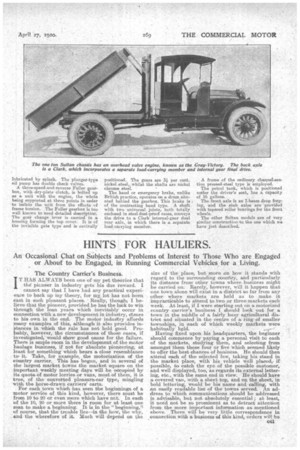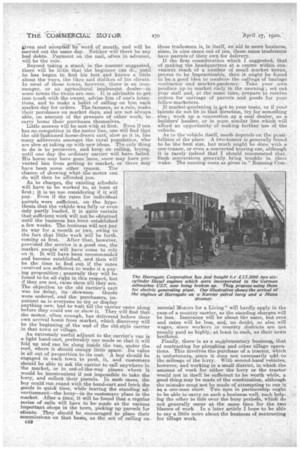HINTS _ FOR HAULIERS.
Page 21

Page 22

If you've noticed an error in this article please click here to report it so we can fix it.
An Occasional Chat on Subjects and Problems of Interest to Those Who are Engaged or About to be Engaged, in Running Commercial Vehicles, for a Living.
The Country Carrier's Business.
IT HAS ALWAYS been one oi my pet theorie.s that the' pioneer in industry gets his due reward. I cannot say that I have had any practical experient-,e to hack up my theory, for my_ lot has not been cast in such pleasant places. Really, though3 I believe that the pioneer, provided he has the luck to win through the lean years which inevitably occur in connection with a new development in industry, etmes to his own in the end. The motor industry affords many examples. of this, although it also proyides instances in which the rule has not held good. Prolaably, however, the circumstances of those eases, if investigated-, would show good cause for the failure. There is ample room in the development of the motor haulage business, if not for absolute pioneering, at least for something which bears a close resemblance to it. Take, for example., the motorization of the country carrier. This has begun, and in several of the largest market towns the market square on the important weekly meeting days will be occupied by its quota of -motor lorries or vans, most of them, it is true, of the converted pleasure-car type, mingling with the horse-drawn carriers' carts.
.For each town which has seen the beginnings of a motor service of this kind, however, there must be from 10 to 20 or even more which have not. In each of the 10, 20 or more there is room for at least one man to make a. beg-inning. It is in the "begirming,'1 of course, that the trouble lies—in the how, the why, and the wherefore of it. Much will depend on the size of the place, but more on how it stands with regard to the surrounding country, and particularly its distance from other towns where business might be carried on. Rarely, however, will it happen that one town alone will exist in a district So far from any other. where markets are held as to make it impracticable to attend to two or three markets each: week. At least, if I were starting out on a motorized country carrier's business should look out for a town in the middle of a fairly busy agricultural district and situated in the centre of a ring of smaller townships, in each of which weekly markets were habitually held. Having fixed upon his headquarters, the beginner should commence by paying a personal visit to each of the markets, studying them, and selecting from amongst them those four or five which seemed likely to offer the best chances of business. He should then attend each of the selected few, taking his stand in . the market place, with his vehicle well placed,, if possible, to catch the eye of the possible customer, and well displayed, too, as regards its-external lettering, etc., with the same end in view. He should have covered van, with a sheet top, and on the sheet, in bold lettering, would be his name and calling, with an easily readable list of the towns served. An address to .which communications should be addressed is advisable, but not absolutely essential; at least, it need not be so prominent as to detract attention from the more important information as mentioned above. There will be very little correspondence in • connection with a business of this kind, orders will be • 'vea and ac:cepted7W-Werd Of mouth, and will be carried out the same day. Neither will there be any bad debtsPayment on the nail, often in advance, will be the rule.
• Beyond taking a stand; in -the manner suggested, there will be little that the beginner can dc, until he has begun to find his feet and knows a little about the ways, the likes and dislikes of his clients. In most of these towns' however, there is an ironmonger, or an agricultural implement dealer—in some ti;wns the twain are one. It is advisable to get into teach with the owner, advise him of one's intentions, and to make a habit of calling on him each market day for orders. The farmers, as a rule, make. their purchases on market days, and are not always able, on account of the pressure of other work, to carry home their purchases themselves.
Little success will be met with at first. Even if one has no competitor in the motor line, one will find that the old-fashioned horse-drawn cart, slow as it is, has many adherents amongst the rural population, who are slow at taking up with new ideas. The enly thing to do is to persevere, and keep, on calling, trying, until one -day the ordinary carrier will have failed. His horse may have gone lame, snow may have prevented him from getting to market, or there may have been some other. reason. The chance of showing what tVe motor can do will then be afforded you.
As to charges, the existing schedule will have to be worked to, at least at first; it is no use-considering if it will pay. Even if the rates for individual parcels were sufficient, on the hypothesis that the vehicle was fully or even only partly loaded, it is quite certain that sufficient work will not be obtained until the business has been established a few weeks. The business will not pay its way for a month or two, owing to the fact that. little work will be forthcoming at first. After that, however, provided the service is a good one, the market people will have come to rely on it. Itewill have been recommended and become established, and then will be the time to find. _out if the rates received are sufficient to make it a pay ing proposition; generally they will be found to be all-right in this respect, but if they are not, raise them till theyare.: The objection to the old carrier's cart was its delay, its slowness. Goods were ordered, and the purchasers, impatient as is everyone to try or display anything new, had to wait till the carrier came along before they could use or show it. They will find that the motor, often enough, has delivered before their own arrival home from market, which discovery will be the beginning of the end of the old-style carrier in that town or village.
An extremely useful adjunct to the carrier's van is a light hand-cart, preferably one made so that it will fold up and' can be slimg inside the van, under the roof, where it should occupy little space. Its value is all out of proportion to its cost. A boy should be engaged in each town to push, it, and easterners should be able to ask the carrier to call anywhere in the market, or in out-of-the-way places where it would be inconvenient if not impossible to take the lorry, and collect their parcels. In such cases, the boy could run round with the hand-cart and fetch the goods in quick time, while leaving the standing advertisemente–the lorry—in its customary place in the market. After a time, it will be found that a regular series of -callz will have to be made at the various: important shops in the town, picking up parcels for clients. They should be encouraged to place their commissions on that basis, as the act of calling on
C42 these tradesmen is, in itself, an aid to more business, since, in nine cases out of ten, those same tradesmen have parcels of their own for delivery. If the first consideration which I suggested, that of making the headquarters at a centre within oonvenient reach of a number of small market towns, proves to be impracticable, then it might be found to be a good idea to combine the callings of haulage contractor and market-gardener. Take your own produce up to market early in the morning; set out your stall and, at the same time, prepare to receive orders for -carriage of parcels and goods for your fellow-marketers.
If market-gardening is Alot to your taste, or if your talents do not lie in that direction, try for something else; work up a connection as a. coal dealer' as a builders' haulier, or in some similar line .which will afford a-n opportunity of making further use of the vehicle.
As to the.'vehicle itself, much depends-on the possibilities of the place: A twestonner is generally found to be the best size, but much might be done with a one-tonner, or even a converted touring car, although it is rarely indeed that I should recommend that. Such conversions generally bring trouble in their wake. The running costs as given in" Running Corn
me-reial Motors for a Living" will hardly apply in the caseof a country carrier, as the standing charges will be less. Insurance will be about the same, but rent and rates will be less, and, no doubt, so also will wages, since workers in country districts are not usually paid sOhighly, at least in cash, as their town brethren.- Finally, there is as a sup'plementary businesee that of contracting for ploughing and other tillage operations. This involves the purchase of a tractor, which is unfortunate,, since it does not necessarily add-to the mileage of the lorry. With second-hand vehicles, however, and working in a small distriet, in which the amount of work for either the lorry or the tractor would not in itself be sufficient to be worth while, a good thing may be made of the combination, although the mistake must not be made of attempting to run it as a one-man show. Two men in partnership ought to be able to carry on such a-business well, each helping the other to tide over the busy periods, which do not generally occur atthe same time for the two *classes of work. In a later article I hope to be able to say a little more about the business of contracting for tillage work.




























